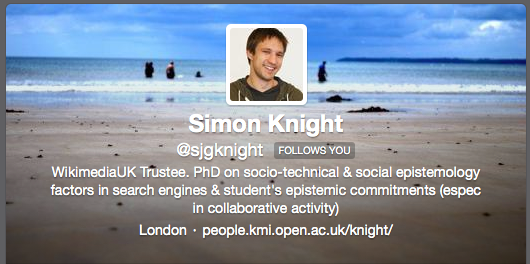Analytics for Epistemic Beliefs?
One of the most profound shifts that takes place through education is not simply a grasp of how wonderful and complex our world is, but a growing awareness of the nature of knowledge itself. As we grow from childhood into educated adulthood, we should mature in our ability to hold ideas ‘loosely’, as constructs which can be inspected and critiqued from different perspectives. Within educational research, these are studied under terms such as epistemic beliefs, behaviours and commitments. How sophisticated is a learner’s notion of what counts as a valid source of information, how it is justified, and how stable it is?
Moreover, since this we’re engaged in a learning analytics research programme, seeking to validate digital traces as proxies for deep learning, how might one identify degrees of epistemic commitment from naturalistic online learner behaviour?
Simon Knight is focusing on these questions in his PhD, co-supervised by me with Karen Littleton. The line of attack is to see whether online search and sensemaking behaviours could serve as a lens into the learner’s mind…
 Go deeper via his blog Finding Knowledge, tune into his active twitter channel, and check out his first year PhD report:
Go deeper via his blog Finding Knowledge, tune into his active twitter channel, and check out his first year PhD report:
Knight, S.J.G. (2013). Learning Analytics for Epistemic Commitments in a Collaborative Information Seeking Environment. Technical Report KMI-13-04 (Dec. 2013), Knowledge Media Institute, The Open University, UK. Available Online: http://kmi.open.ac.uk/publications/techreport/kmi-13-04
Abstract: This report argues that information seeking – the searching, frequently conducted on search engines such as Google, in order to retrieve information for some needs – should be of interest to education. It further suggests that such interest should focus on information commitments, which are implicated in the ways that people find, and process, information. Building on literature researching collaboration in both education and information seeking research, I claim that Collaborative Information Seeking (CIS) is a good lens through which to research information commitments. Indeed, a key component of this report is a preliminary proposal for a new theory of epistemic commitments, which addresses some concerns with prior research on epistemic beliefs, epistemic cognition, and epistemic (or information) commitments. Two novel components of that new theory are a focus on information trace as the core of epistemic activity, and a focus on the ‘dialogic space’ as particularly epistemically relevant. The report goes on to propose a technological solution for the analysis of epistemic commitments in the form of a Computer Supported Collaborative Learning/Work (CSCL/W) environment. This proposal includes an analysis of trace for epistemic commitments, and a discussion of relevant discourse centric learning analytics for the analysis of chat data around epistemic activity. While discourse data has received some analysis in CIS research, the analysis has generally been somewhat shallow in its focus; the proposal made in this report is for a deeper analysis, both as an extension of CIS research, and as of interest to learning analytics (and indeed learning researchers generally) who are interested in the collaborative context of learning. The report is thus proposes a relevant research theory to investigate the ways in which people make commitments in online information seeking environments, and how they might be supported. The report comprises three sections: 1. I start with a literature review, which begins with an overview of some relevant theoretical, and philosophical, literature relating this particularly to learning analytics (section 2). I then introduce the relevant literature on information seeking and epistemic cognition (or, as I propose, commitments) (sections 3-8). Section 9 then introduces some relevant literature on tasks to probe epistemic commitments, while section 10 introduces some core software to do so. 2. Section 11 then discusses my preliminary practical work, with respect to pilot empirical work and some key skills gained 3. Section 12 then introduces my formal research proposal – including research questions, proposed tools, and practical experiments to be conducted.